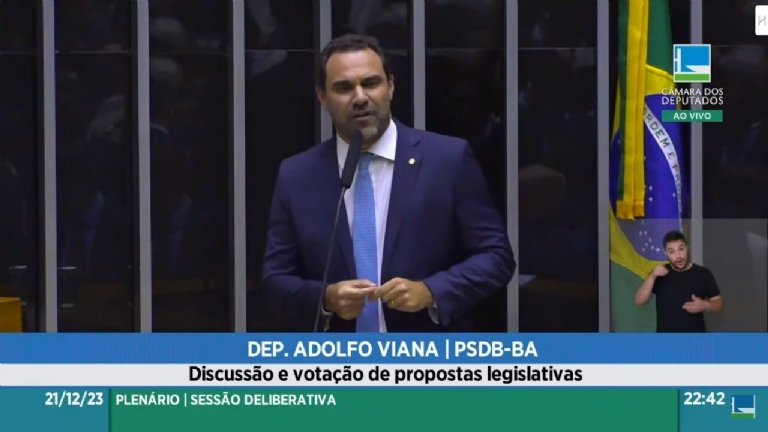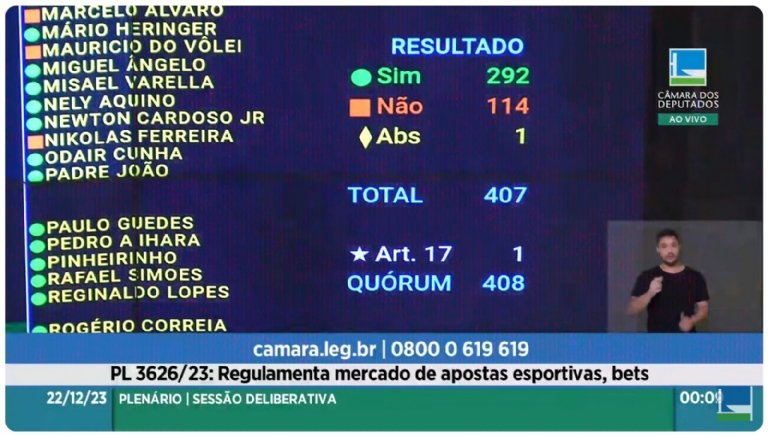

The Brazilian iGaming sector is officially emerging with this approval. After negotiations, an agreement was reached, and the Chamber of Deputies overturned the Senate's prohibition, allowing online gambling.
Following a setback caused by amendments to PL 3626/2023 in the Senate, which excluded online gambling, the Chamber reversed the decision, and virtual event betting is now part of what was approved and will become law after presidential sanction.
In the Chamber, the concession fee was endorsed at a maximum of R$ 30 million for up to three brands over a five-year period. Additionally, the 12% tax rate on the GGR (Gross Gaming Revenue) was maintained as direct taxation on iGaming activities in Brazil.
Bettors, as defined in the Senate, will pay 15% as income tax on the net result of bets over a year, to be collected in the month following the assessment, provided it exceeds the first bracket of the progressive Personal Income Tax (IRPF) table (R$ 2,112.00).
Online games, within the approved project, can only be offered virtually. The installation of equipment in physical establishments intended for the sale of virtual sports bets is not allowed.
The report outlines the monthly Inspection Fee due for the commercial exploitation of sports betting progressively based on the operator's net revenue, as follows:

Tax Rates for Companies and Bettors
The sports betting regulation project is one of the proposals from the Ministry of Finance to increase revenue. For this purpose, it establishes taxation on prizes and betting houses, operating fees, and rules for sector advertising.
Regarding taxation, initially, the government's economic team set a rate of 18% for sports betting houses and up to 30% for prizes obtained by bettors.
In the Senate, the rate changed to 12% on revenue for online betting companies. For bettors, the taxation, which will be 15%, will only apply to the gain obtained from the prize, deducted from the amount wagered. The Chamber maintained these tax rates.
Bettors will only be charged once a year if the prize value exceeds R$ 2,112—the exemption threshold for Personal Income Tax (IRPF).
Other Points
The text also states that a sports betting company will need government authorization to operate in the country. The betting house must be headquartered and established in Brazil and must have a Brazilian partner holding at least 20% of the corporate capital;
The company will have to pay an operating license fee in Brazil that can reach up to R$ 30 million and will be valid for five years.

Partners or the controlling shareholder of the betting house cannot participate, directly or indirectly, in a Sociedade Anônima de Futebol (SAF) or professional sports organization; be a leader of a Brazilian sports team or of financial institutions and payment processors that process bets.
* Betting by minors and individuals who may influence the outcome will be prohibited.
* The company must adopt identification or facial recognition technology to verify the bettor's identity.
Resource Division
According to the text, the division of collected resources will be as follows:
* 36% for the Ministry of Sports and sports committees;
* 28% for Tourism;
* 13.6% for Public Security;
* 10% for the Ministry of Education;
* 10% for social security;
* 1% for health;
* 0.5% for civil society entities;
* 0.5% for the Fund for Equipment and Operationalization of End Activities of the Federal Police (Funapol);
* 0.40% for the Brazilian Agency for Industrial Development.
The aspects previously defined by the Chamber and endorsed by the Senate regarding responsible gaming, sports integrity, and advertising, as well as the prohibition of bets by minors, were maintained in the approved final report.
Payment for License
Bets will be operated by companies authorized by the Ministry of Finance, with headquarters and administration within the national territory. They must demonstrate experience in gaming and meet other technical requirements set by the Executive.
Additionally, companies must have a Brazilian partner holding at least 20% of the social capital. The controlling shareholder cannot be directly or indirectly involved in professional sports organizations, act as a leader, or be associated with financial institutions processing bets.
Interested companies must pay up to R$ 30 million for the right to operate up to 3 commercial brands for up to five years. The project obliges companies to adopt player service practices, combat money laundering, encourage responsible gaming, and prevent fraud and manipulation of bets.
This was another change made by senators and accepted by the Chamber. In the proposal approved by deputies in September, the same amount was foreseen, but for only one brand and for three years.
Betting houses must adopt identification procedures. The goal is to verify the validity of bettors' identities, requiring the use of identification and facial recognition technology.
Combatting Addiction
Aspects previously defined by the Chamber and endorsed by the Senate regarding responsible gaming, sports integrity, and advertising, as well as the prohibition of bets by minors, were maintained in the approved final report.
Also, the Ministry of Finance's responsibility to regulate the obligation for betting operators to develop systems to monitor customer activity continues in the approved project.
The goal is to identify harms associated with gambling from the moment an account is opened. The text specifies that Minister Haddad's ministry will be responsible for regulating the obligation for betting operators to develop systems to monitor customer activity.
Several criteria have been established:
* Customer spending;
* Spending patterns;
* Time spent gambling;
* Indicators of gambling behavior;
* Customer-initiated contact;
* Use of gambling management tools.

Fraud Prevention
The approved proposal authorizes the suspension of payments for bets investigated for result manipulation. It also requires companies to verify the identity of bettors using facial recognition technology.
Operators must monitor customer activities to identify potential harm or abusive use. Platforms will also be required to develop time-limiting features for users.
Banned Players
Players prohibited from playing include, among others:
* Individuals under 18 years old;
* People diagnosed with gambling disorders;
* Individuals with influence over sports events or the gaming platform;
* Sports officials, coaches, referees, agents, and athletes.
Advertising
Communication and advertising actions for betting lotteries, broadcast by operating agents, must include discouragement warnings about gambling and cautions about its harms. They must also observe restrictions on broadcast times and channels.
Advertisements that portray betting as socially attractive or contain statements from well-known personalities suggesting that gambling contributes to social or personal success will be prohibited.
Source: GMB